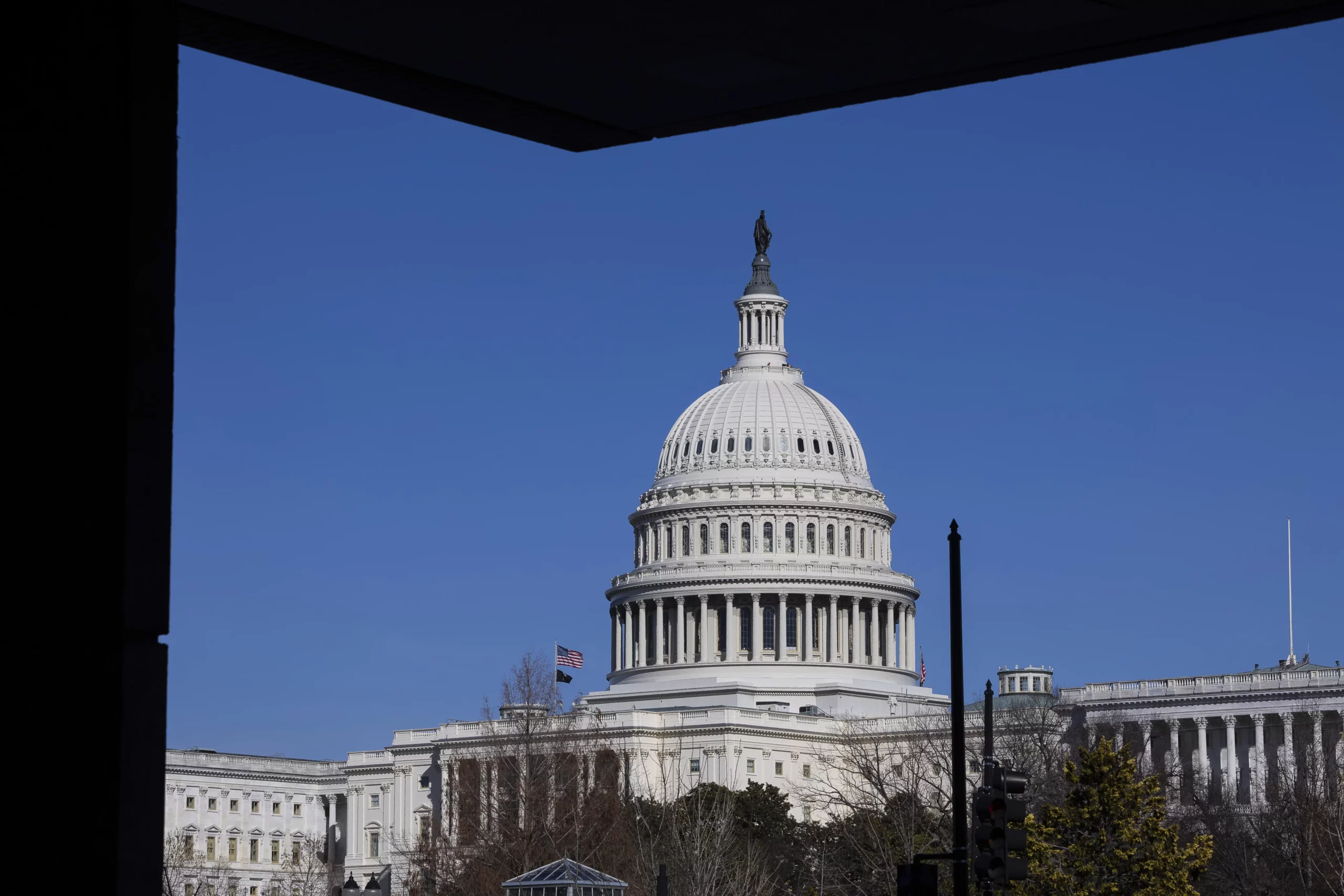

The race for control of the Senate in 2026 has kicked off with incumbents up for reelection making decisions about their political futures, shaking up the map for next year’s midterm elections.
Political handicappers like the Cook Political Report and Sabato’s Crystal Ball have predicted that Democrats have few opportunities to claw back the majority. But, Sen. Tina Smith’s (D-MN) retirement announcement this week, the second Democratic incumbent to bow out of the 2026 election after Sen. Gary Peters (D-MI), is making their efforts even more challenging.
FULL LIST OF EXECUTIVE ORDERS, ACTIONS, AND PROCLAMATIONS TRUMP HAS MADE AS PRESIDENT
In order to take back control of the chamber next year, Democrats would need a net pickup of four seats, but only a handful of the 22 Republican seats are in competitive states and Democrats also must defend battleground seats in Georgia and Michigan. Overall, Democrats must defend 13 seats.
Democrats are pushing for clarity on the 2026 map
Senate Minority Leader Chuck Schumer (D-NY) has asked his Democratic incumbents to make a decision on whether they are running for re-election as soon as possible, according to a person familiar with conversations.
Schumer and Sen. Kirsten Gillibrand (D-NY), chairwoman of the Democratic Senatorial Campaign Committee (DSCC) are attempting to develop a strategy early. The push for more information comes as Smith and Peters announced their intentions to retire over the last two weeks.
All eyes are on Sen. Jeanne Shaheen (D-NH), who is up for a fourth term and has not said if she is seeking reelection. If the 78-year-old decides to retire, the race will become a much more expensive for Democrats, causing them to shift resources and their attention from more competitive states. New Hampshire elected Republican former Sen. Kelly Ayotte as governor in November but has had all Democrats representing the state in the congressional delegation since 2016.
“I think a lot of us are pulling for Shaheen to seek reelection; I don’t think we can handle another open seat contest right now. She’s been giving some mixed signals,” a Democratic operative familiar with discussions told the Washington Examiner granted anonymity in an effort to speak candidly.
Sen. Dick Durbin (D-IL), 80, also has not made a decision about whether he intends to seek re-election just yet. While the seat is not a competitive one, a retirement announcement from the No. 2 Senate Democrat could set off a statewide primary among prominent Illinois Democrats.
Senate Democrat’s most vulnerable incumbents
One of Democrat’s most vulnerable incumbents will likely be Sen. Jon Ossoff (D-GA), who would be seeking a second term in a state President Donald Trump carried by 2 points last fall. Ossoff has not announced his reelection bid, but has sent strong signals he intends to run again.
Democrats will also be forced to defend Peters’ open seat in Michigan, a state that backed Trump by a point in November. Sen. Elissa Slotkin (D-MI) was elected on the same ballot as Trump but won on a narrow margin.
Smith’s exit also opens up a Senate seat in a state that has shown signs of shifting away from Democrats. Former President Joe Biden won the state by 7 points in 2020, while former Vice President Kamala Harris won by only 4 points in 2024.
Senate Republicans are already looking at both states as pickup opportunities.
“Minnesota is arguably slightly harder than Michigan. Both are states that we haven’t elected a Republican senator … in a long time. But, I think that these are different times, and people are looking for change in this country,” said Senate Majority Leader John Thune (R-SD), in an interview on Fox News on Friday.
“I think even states that have traditionally been blue states present opportunities for us, and if we do things right, put up a record of accomplishment and support the president…We’re going to do everything we can,” Thune added.
Sen. Ed Markey (D-MA), 78, Jack Reed (D-RI), 75, Cory Booker (D-NJ), 55, and Jeff Merkley (D-OR), 68, have decided they will run for another six-year term. Sens. Ben Ray Luján (D-NM), 52, Mark Warner (D-VA), 70, John Hickenlooper (D-CO), 73, and Chris Coons (D-DE), 63, have not announced their plans but appear prepared to run for reelection.
Democrats could make a play for the Ohio and Florida seats that will be on the ballot next year, thanks to the respective resignations of Vice President JD Vance and Secretary of State Marco Rubio. Sen. John Husted (R-OH) and Ashley Moody (R-FL) will be up for special elections in 2026.
Republican seats most at risk
Sens. Susan Collins (R-ME), 72, and Thom Tillis (R-NC), 64, have both announced their intentions to seek reelection. The two could face primary challenges from more conservative Republicans and both are likely to face competitive general election contests if they survive primaries.
Collins, who is seeking a sixth term, is the only Republican running in a state won by Vice President Kamala Harris, but has proven to be a difficult incumbent to oust by Democrats. Tillis could be facing Democratic Gov. Roy Cooper in a general election, but North Carolina is a state Trump won by three points.
Republicans expected to face competitive intraparty challenges
Sen. John Cornyn (R-TX), 73, who has announced his intention to run in 2026, could face the toughest primary challenge of his career. Attorney General Ken Paxton, a Trump ally, continues to hint that he’s interested in challenging Cornyn in a Republican primary
“As far as my plans, right now, I don’t know. I’m just going to serve as attorney general,” Paxton said in a recent interview on Fox News. “I’m looking potentially at the U.S. Senate. We’ll look at that over the next couple of months.”
Sen. Bill Cassidy (R-LA) has already drawn a 2026 primary challenger in Louisiana Treasurer John Fleming. Fleming, who announced his bid in December, alluded to Cassidy’s 2021 vote to convict Trump at his second impeachment trial, saying “those who turned their backs on [Trump] and America First were not committed to his fight to make America great again.”
GOP Senate slate for 2026
Sen. Tom Tuberville (R-AL), 70, Cindy Hyde-Smith (R-MS), 65, Joni Ernst (R-IA), 54, and Pete Ricketts (R-NE), 60, Lindsey Graham (R-SC), 69 and Bill Hagerty (R-TN), 65, have announced their intentions to run in 2026.
Sens. Dan Sullivan (R-AK), 60, Tom Cotton (R-AR), 47, Roger Marshall (R-KS), 64, Steve Daines (R-MT), 62, Markwayne Mullin (R-OK), 47, Mike Rounds (R-SD), 70, Shelley Moore Capito (R-WV), 71, and Cynthia Lummis (R-WY), 70, have not announced their plans but are expected to seek re-election. All of these seats are considered to be safely Republican.
Sen. Marsha Blackburn, 72, (R-TN) is eyeing a run for Tennessee governor. She just won her second Senate term in November, so she would not have to give up her seat to run.
GOP retirement speculation
Sens. Mitch McConnell (R-KY), 82, and Jim Risch (R-ID), 81, have not publicly disclosed their 2026 plans.
McConnell, who stepped down as Senate GOP leader, has been experiencing health issues in recent years. The Kentucky senator, who is in his seventh term, fell as he exited the Senate chamber recently.
CLICK HERE TO READ MORE FROM THE WASHINGTON EXAMINER
A battle to replace McConnell is starting to take shape, even though McConnell hasn’t announced plans to leave the Senate. Rep. Andy Barr (R-KY), has told people he intends to run for McConnell’s seat if he retires, according to reporting from CBS News.
Other challengers could be Dan Cameron, former Kentucky attorney general who fell short in his bid for governor against incumbent Democratic Gov. Andy Beshear, Kentucky businessman Nate Morris, and Republican Reps. James Comer (R-KY) and Thomas Massie (R-KY).






